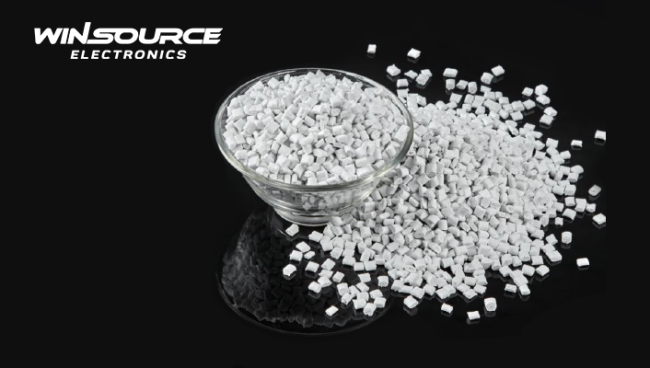
PBT offers various advantages, such as mechanical strength, heat, and chemical resistance. However, it does have some water absorption tendencies and is not biodegradable under normal environmental conditions. These properties make it an excellent choice for numerous applications across industries. However, its resistance to biodegradation requires considerations for proper disposal or recycling methods.
On the other hand, Polybutylene Terephthalate (PBT) GF30 refers to a specific type of thermoplastic material that incorporates a blend of PBT polymer with 30% glass fiber reinforcement. This combination enhances the material’s mechanical properties, making it suitable for various engineering applications, particularly in manufacturing connectors and other electronic components.
The benefit of using PBT30
Mechanical Strength
The addition of 30% glass fiber reinforcement significantly enhances the material’s mechanical properties, providing high tensile strength, stiffness, and resistance to deformation. This translates to components capable of withstanding heavy loads and stresses without compromising structural integrity.
Heat Resistance
PBT GF30 exhibits good resistance to elevated temperatures, retaining its properties even when exposed to heat. This characteristic makes it suitable for applications where components may encounter varying temperature ranges, ensuring stability and reliability over time.
Chemical Resistance
The material showcases resistance to various chemicals, oils, and solvents, enhancing its suitability for applications where exposure to these substances is prevalent without compromising its structural integrity.
Dimensional Stability
PBT GF30 maintains its shape and dimensions even under fluctuating temperatures, ensuring consistent performance in different environmental conditions. This stability is crucial for maintaining the functionality of connectors and components.
Electrical Insulation
The material possesses good electrical insulation properties, making it ideal for electrical connectors, sockets, and housings. It prevents electrical currents from leaking and ensures safe and reliable performance in electronic applications.
Durability and Longevity
PBT GF30’s robustness and resistance to wear and tear contribute to the longevity of components made from this material. It ensures a longer product lifecycle in various industries, reducing maintenance and replacement costs.
Design Flexibility
It offers design flexibility during manufacturing processes, allowing for intricate designs and precise molding of components. This flexibility will enable manufacturers to create complex shapes and configurations suited to specific applications.
Cost-Efficiency
Despite its high-performance characteristics, PBT GF30 remains relatively cost-effective compared to other high-performance materials. This makes it an attractive choice for manufacturers seeking durability without significantly increasing production costs.
Environmental Considerations
PBT GF30 is known for its recyclability, contributing to environmentally friendly practices and sustainability efforts in manufacturing.
PBT GF10 Connector
A PBT GF10 connector follows a principle similar to that of PBT GF30, but with a lower % glass fiber content of 10%. While it shares some properties with GF30, it may exhibit slightly different characteristics due to the varying fiber content.
Applications of PBT GF30 and GF10 Connectors
- Electronics: Due to their electrical insulation properties and durability, both types of connectors are extensively used in the electronics industry to manufacture components like electrical connectors, sockets, and housings.
- Automotive: These materials are employed in automotive applications for connectors, sensor housings, and other components where heat resistance and mechanical strength are vital.
- Industrial Equipment: PBT GF30 and GF10 connectors are also utilized in various industrial machinery and equipment, offering reliability in harsh operating environments.
- Consumer Goods: These materials are found in consumer electronics, appliances, and other consumer goods where high performance and reliability are required.
PBT GF30 is a specialized material known for its robustness, heat resistance, and mechanical strength. These materials, often used in connectors and various electronic components, offer a blend of properties crucial for reliable performance in diverse industries and applications.
FAQs
Is PBT a type of plastic?
Yes, PBT (Polybutylene Terephthalate) is a type of thermoplastic polymer belonging to the polyester family. It’s widely used in various industries due to its excellent mechanical properties, including high stiffness, good dimensional stability, and resistance to heat and chemicals.
Is PBT UV-resistant?
Regarding its UV resistance, PBT, in its pure form, isn’t inherently UV resistant. Exposure to ultraviolet (UV) radiation can cause degradation of PBT over time, leading to discoloration, embrittlement, and reduced mechanical properties. Additives or modifications can be incorporated into PBT formulations during manufacturing to enhance its UV resistance. These additives or treatments can help mitigate the effects of UV exposure, improving the material’s resistance to degradation from sunlight.
Is PBT synthetic?
Yes, PBT is synthetic. It’s a type of engineering thermoplastic polymer that is synthesized through chemical processes involving the reaction of terephthalic acid or its dimethyl ester with 1,4-butanediol. This results in creating the PBT polymer, which is then processed into various forms for different applications, including manufacturing components for automotive, electrical, and industrial purposes.
Does PBT absorb water?
PBT (Polybutylene Terephthalate) has a relatively low water absorption rate compared to other plastics. However, it’s not entirely impervious to moisture. PBT can absorb a small amount of water when exposed to high humidity or immersed in water over time. This water absorption can affect its mechanical properties, such as dimensional stability and strength, although the effect is typically less significant than other polymers.
Is PBT biodegradable?
PBT is generally considered non-biodegradable under typical environmental conditions. It’s a synthetic polymer that doesn’t readily break down in natural environments. While research and development efforts are ongoing to create more environmentally friendly plastics, standard PBT is not biodegradable.
© 2024 Win Source Electronics. All rights reserved. This content is protected by copyright and may not be reproduced, distributed, transmitted, cached or otherwise used, except with the prior written permission of Win Source Electronics.

COMMENTS